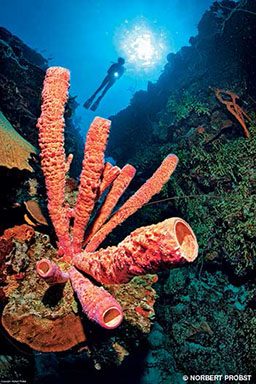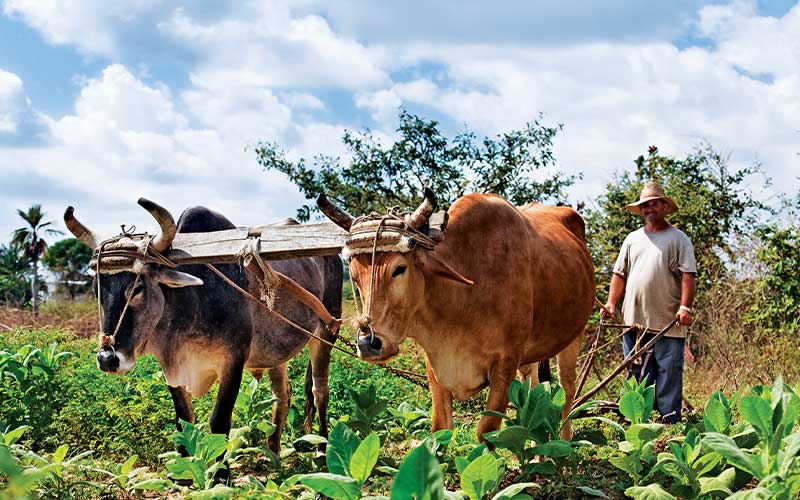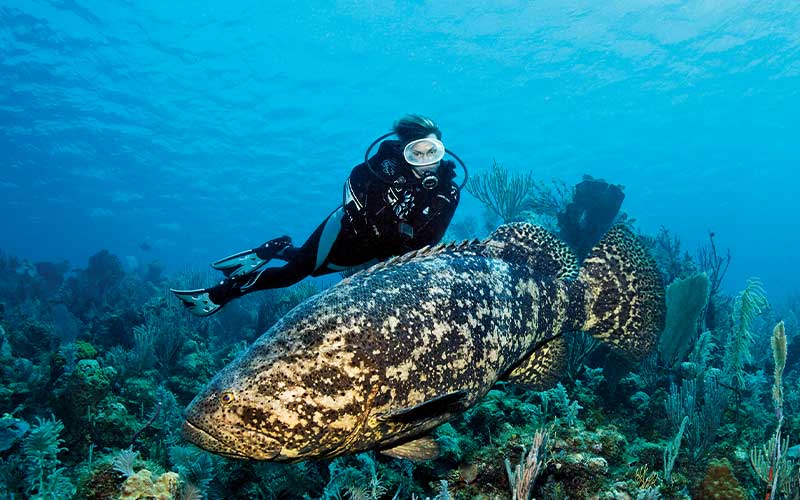A clipboard-toting young soldier in green fatigues counted heads as we boarded the dive boat. When the boat docked after the dive, he took another count. It’s the government’s intention that all divers who go to sea come back — to Cuba.
We’re on the Guanahacabibes Peninsula at the far western end of the island nation, five hours from Havana but only 100 miles from Mexico’s Yucatan Peninsula. The Villa Maria la Gorda Hotel and International Diving Center makes three daily trips to more than 30 dive sites located just minutes from shore.
U.S. regulations prohibit Cuban “travel-related transactions,” which means American citizens can’t spend money to travel to, from or within Cuba. There are a few exceptions, including for government officials, religious groups, education, research and journalism, which is how I came to be here. Meanwhile, divers from elsewhere on the planet have long enjoyed a marine environment that remains much as it was 50 years ago.
An “Accidental Eden”
Both internal and external forces created Cuba’s surreal time warp. In response to Fidel Castro’s 1959 revolution, which created a socialist economy, the United States implemented a trade embargo that is still in place today. The travel restrictions and other economic sanctions led to reduced pressure on the island’s marine resources. Furthermore, for decades Cuban development efforts largely ignored tourism, and even today it is seen as something of a necessary evil.
Cuba’s small population (11 million residents versus 19 million in Florida, its geographic equal) also contributed, according to Fernando Bretos, director of the Ocean Foundation’s Cuban marine program. So did the relative remoteness of three of its four coral-reef chains, particularly in light of agricultural practices on the island. Cuba’s farming is largely organic — not by policy or intention, but because the pesticides and fertilizers used throughout the industrialized world are prohibitively expensive or simply unavailable to Cuban farmers — and this minimizes agricultural runoff that could harm the reefs.
Walking the Walk
However, these uniquely healthy seas also owe much to an intentional commitment to the environment made in the 1990s. “Cuba began walking the walk,” said Dan Whittle, Cuba program director for the Environmental Defense Fund. “They established policies that recognized the marine environment’s economic importance and the tourism value of nature, and they began developing the coast cautiously. “

Of course, any country’s laws and policies are only as good as continuing political will to uphold them, and Whittle notes ongoing conflict between Cubans who see environmental protection as a luxury in a country struggling to feed its people and those who say it’s a worthwhile long-term investment. So far, Cuba’s current leadership seems committed to sustainability, but looming economic changes place it between Scylla and Charybdis: On one hand, economic development threatens the health of Cuba’s marine environment, but on the other, economic growth will allow Cuba to invest in better infrastructure, research and resources to protect the natural environment. “Economic growth can be the savior of environmental programs as well as a threat to them,” Whittle said.
The threats include increased impact from more tourists. An end to the U.S. embargo — conceivably on the horizon — will mean an immediate 10-percent increase in visitors, at a minimum. “There will be tremendous temptation to cut corners,” Whittle said, noting that in other countries, environmental protection has taken a backseat when money starts rolling in.
The Gardens of the Queen, an archipelago on the island’s south side, is one of Cuba’s most renowned dive locations. To date, protecting its pristine coral reefs has been a priority, and diving has benefitted local communities while the reefs have remained healthy. But Cuba is expanding tourism here, and scientists are concerned the Gardens will become one of the first places overburdened by tourism. “The demand could just overwhelm the infrastructure,” Whittle said, “and as Cuba races to accommodate that demand they may mess it up.”
Cuba’s economic growth is also fueling increased oil and gas development. This poses a major potential threat to the marine environment in the form of infrastructure development and in the possibility of a spill, Whittle added. More prosperity could also change Cuba’s system of agriculture. Increased use of pesticides and fertilizers will mean more land-based runoff and consequent eutrophication, to the detriment of the marine environment.

Strategically Situated
Cuba occupies the junction of the Atlantic Ocean, Caribbean Sea and Gulf of Mexico — essentially one large, interconnected marine environment, and one that relies heavily on Cuba’s healthy ecosystems. “Lobster larvae, larval reef fish and coral spawn all travel by ocean currents from productive Cuban reefs throughout the system,” said Bretos, who was involved in a 1991 study that released 1,900 floating bottles on the south side of Cuba. One of them traveled to West Palm Beach in just 46 days. “If Cuban reefs go downhill, it will affect us all.”
Scientists and conservationists began working years ago to keep that from happening. Scientists from the U.S., Cuba and Mexico formalized this work in 2007, forming the Trinational Initiative for Marine Science and Conservation, an ambitious research effort with the ultimate goal of establishing a multinational, coordinated approach to managing and protecting this shared marine environment. The Environmental Defense Fund, the Ocean Foundation, the Nature Conservancy and Mote Marine Laboratory are just a few of the players that are already involved.

Back at Maria la Gorda, we enjoyed spectacular visibility, balmy water temperatures and thriving reefs in depths from 15 to 100 feet. Sandy valleys and seagrass beds lay between them, and every dive site swarmed with marine life. This is one of more than 100 marine protected areas (MPAs) proposed or in place in Cuba — the largest network in the Caribbean. But here, as elsewhere, MPAs suffer from lack of awareness and enforcement. The crew tossed cigarette butts from the dive boat, and I spotted a fishing vessel on the horizon that was clearly in protected waters. Still, it’s a start.
“This is a unique time in the history of Cuba and in U.S.-Cuban relations,” Whittle said. “There is real desire in both countries to make Cuba a model for sustainability and biodiversity conservation and for innovative and effective fisheries and marine management. That will benefit not just the resources but the people of Cuba as well. I think we can show that you can have a healthy economy and a healthy environment.”
“What many will tell you is that Cuba is the linchpin, given its size, location, diversity,” he added. “It’s key to a healthy Caribbean, Gulf and Atlantic. People go dive there and come back raving; they had no idea such amazing coral reefs were so close.” The challenge is to do all we can to keep them amazing.

© Alert Diver — Q4 Fall 2013